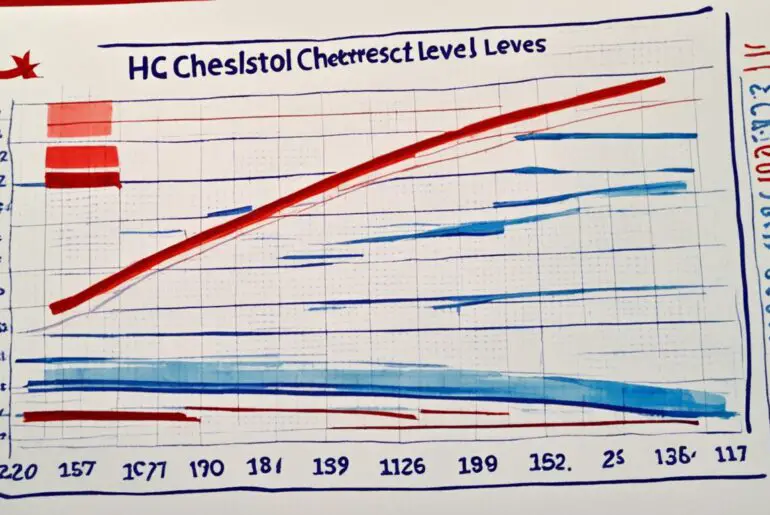Are you on a weight loss journey and looking for a quick fix? Have you heard about the HCG Diet and its promises of rapid results? Before you dive into this popular diet trend, it’s crucial to understand the impact it can have on your mental well-being.
The HCG Diet, which combines an extremely low-calorie diet with injections of the pregnancy hormone HCG, has gained attention for its potential weight loss benefits. However, there are important considerations regarding its effects on emotional balance and overall mental health.
Contrary to common belief, sustainable weight loss isn’t just about shedding pounds; it’s about achieving a healthy mind and body. So, how does the HCG Diet affect your emotional well-being? Does it offer a solution or exacerbate existing mental health challenges? Let’s explore the truth behind the HCG Diet and its impact on emotional well-being.
Key Takeaways:
- The HCG Diet is an extreme low-calorie diet combined with HCG injections, but it’s not recommended for healthy weight loss.
- Rapid weight loss from extreme calorie restriction can have negative effects on mental health, leading to symptoms such as irritability and depression.
- The HCG Diet puts individuals at an increased risk of developing gallstones and can cause poor sleep quality, water retention, and heart issues.
- To prioritize emotional well-being during your weight loss journey, it is essential to focus on balanced nutrition and seek professional advice.
- Remember, achieving long-term weight loss and emotional well-being requires a holistic approach that encompasses healthy eating, regular exercise, and prioritizing mental health.
What Is the HCG Diet?
The HCG Diet is a combination of a highly restrictive low-calorie diet (500 calories per day) and injections of HCG supplements. However, it is not considered a safe eating plan and can lead to dangerous side effects. Evidence shows that HCG injections do not lead to additional weight loss beyond what can be achieved through calorie restriction alone.
The diet is unsustainable and can cause side effects like weakness, nausea, constipation, dehydration, and hair loss. It is important to recognize that the HCG Diet is not recommended for anyone, especially pregnant women, breastfeeding women, children, and the elderly.
The Dangers of the HCG Diet
Table: Dangerous Side Effects of the HCG Diet
| Side Effects | Description |
|---|---|
| Weakness | The extremely low-calorie intake can lead to weakness and lack of energy. |
| Nausea | Many individuals experience feelings of nausea while on the HCG Diet. |
| Constipation | The severe calorie restriction can cause digestive issues like constipation. |
| Dehydration | The lack of adequate fluid intake can result in dehydration. |
| Hair Loss | Some individuals may experience hair loss as a side effect of the HCG Diet. |
It is important to be aware of these dangerous side effects and to prioritize your health when choosing a weight loss plan. The HCG Diet may promise quick results, but the risks outweigh the benefits. Instead, opt for a balanced, calorie-controlled diet and engage in regular physical activity for sustainable and healthy weight loss.
Health Benefits of Weight Loss

When it comes to weight loss, the benefits extend far beyond just fitting into smaller jeans. Shedding those extra pounds can have a profound impact on your overall health and well-being. Let’s explore some of the remarkable physical benefits that come with losing weight.
Improved Heart Health
One of the key advantages of weight loss is the positive effect it has on your cardiovascular system. Carrying excess weight puts strain on your heart, increasing the risk of heart disease and other related conditions. By losing weight, you can lower your blood pressure, reduce cholesterol levels, and decrease the risk of heart attacks and strokes.
Increased Energy Levels
Excess weight can leave you feeling sluggish and drained of energy. However, by shedding those extra pounds, you’ll experience a noticeable boost in your energy levels. With a lighter body, you’ll find it easier to perform daily tasks, engage in physical activities, and keep up with the demands of a busy lifestyle.
Better Mobility
Carrying excess weight can strain your joints and limit your mobility. However, weight loss can alleviate this strain and improve your ability to move freely. By reducing the pressure on your joints, losing weight can help alleviate pain and increase your range of motion, allowing you to enjoy a more active and fulfilling life.
Enhanced Sex-Drive
Weight loss also has a positive impact on your sex life. Shedding those extra pounds can help increase libido and improve sexual function. With improved cardiovascular health, increased energy levels, and a boost in self-confidence, you’ll find yourself feeling more passionate and enjoying a more satisfying intimate relationship.
Reduced Risk of Chronic Diseases
Excess weight is closely linked to an increased risk of chronic diseases such as diabetes, heart disease, hypertension, orthopedic problems, and certain types of cancer. By losing weight, you can significantly decrease the likelihood of developing these conditions and enhance your overall health and well-being.
To fully experience these physical benefits, it’s essential to adopt a holistic approach to weight loss. This includes making healthier food choices, engaging in regular physical activity, and maintaining a consistent routine. By prioritizing long-term lifestyle changes, you can not only achieve your weight loss goals but also enjoy an improved quality of life and a reduced risk of chronic diseases.
Psychological Benefits of Weight Loss
Weight loss can have a profound impact on our psychological well-being. When we shed excess weight, it can instill us with a newfound sense of confidence, improve our self-esteem, and enhance our overall mental well-being. This positive transformation can also alleviate symptoms of depression and anxiety, leading to a more fulfilling and contented life.
Being overweight often brings feelings of insecurity, low self-esteem, and isolation. The journey of weight loss not only helps us shed physical weight but also empowers us to tackle these psychological factors head-on. As we make progress in our weight loss journey, we begin to build a stronger sense of self-worth, boosting our confidence levels and fostering a more positive self-image.
Addressing psychological factors is crucial for long-term weight loss success. By recognizing the impact that weight has on our emotions and mental well-being, we can make lasting lifestyle changes and develop healthier coping mechanisms. This includes adopting new behaviors, nurturing a positive mindset, and seeking support from loved ones or professionals.
Confidence and Self-Esteem
Losing weight can significantly improve our confidence and self-esteem. As our bodies transform, we start to feel more comfortable and proud of our appearance. When we achieve weight loss milestones, big or small, it reinforces our belief in our own abilities and reaffirms our commitment to self-improvement.
“Losing weight has given me a new sense of confidence. I feel proud of my achievements and more comfortable in my own skin. It has translated into every aspect of my life, from professional success to personal relationships.” – Jane Smith
Emotional Well-Being
Weight loss can have a profound impact on our emotional well-being. It can alleviate symptoms of depression and anxiety, providing a sense of relief and lightness. As we prioritize our health and make positive choices for our bodies, we also cultivate a healthier mindset, leading to a more positive and optimistic outlook on life.
Overcoming Isolation
Being overweight often leads to feelings of isolation and social withdrawal. We may avoid social situations or feel self-conscious about our appearance. However, as we embark on our weight loss journey and start noticing positive changes, we begin to regain our confidence in social settings. Weight loss can help us feel more connected to others and improve our overall social well-being.
It is essential to recognize that weight loss is a journey that requires commitment, mindset shifts, and behavioral changes. While weight loss can improve our psychological well-being, it is crucial to approach it holistically, prioritizing our mental health and overall happiness along the way.
| Psychological Benefits of Weight Loss | |
|---|---|
| Increased confidence and self-esteem | Weight loss can boost our confidence levels, improve our self-image, and enhance our self-esteem. |
| Improved emotional well-being | Losing weight can alleviate symptoms of depression and anxiety, leading to better emotional health. |
| Reduced feelings of isolation | Weight loss can help us overcome social withdrawal and improve our social connections. |
The Dangers of the HCG Diet

The HCG Diet is an extremely unsafe method for weight loss that comes with several significant dangers. This diet, which involves severe calorie restriction and injections of HCG, disrupts hormones, damages metabolism, and leads to muscle wasting. It is essentially a starvation diet that deprives the body of essential nutrients, resulting in nutrient deficiencies and causing unbalanced body chemistry. Additionally, any weight lost on the HCG Diet is likely to be regained once the diet is stopped.
The HCG injections, which are a critical component of this diet, can also have adverse effects on the body. They can cause headaches, restlessness, blood clots, dizziness, and even depression. Overall, the HCG Diet not only fails to provide long-term weight loss but also poses significant risks to one’s health.
The HCG Diet is an unsafe and unsustainable approach to weight loss. Its extreme calorie restriction and hormone injections can lead to metabolic damage, muscle wasting, and nutrient deficiencies. It is crucial to avoid this dangerous diet and instead opt for safer and more sustainable weight loss methods.
By choosing safer weight loss strategies that focus on balanced nutrition, regular physical activity, and overall well-being, individuals can achieve long-term success without compromising their health. It is important to prioritize sustainable lifestyle changes and consult with healthcare professionals or registered dietitians for personalized guidance on healthy weight loss.
Achieving Long-Term Weight Loss
When it comes to long-term weight loss, it’s important to address not only the physical aspects but also the emotional habits, hormone balance, and overall lifestyle. Simply focusing on diets and exercise alone may not yield sustainable results in the long run. Understanding the root causes of weight gain and developing effective strategies to address them is key.
One important aspect to consider is the role of emotional habits in weight management. Many of us turn to food for comfort or as a coping mechanism for stress or other emotions. By identifying and understanding these emotional triggers, we can develop healthier alternatives and coping mechanisms, promoting a more balanced relationship with food.
Another crucial factor is achieving hormone balance. Hormones play a significant role in regulating our appetite, metabolism, and overall weight. Imbalances in hormones such as insulin, cortisol, and leptin can make weight loss more challenging. Prioritizing a balanced diet, regular exercise, and stress management techniques can help restore hormonal balance and support long-term weight management.
Lifestyle changes are also key in achieving and maintaining long-term weight loss. This includes adopting healthier habits not only in terms of nutrition and exercise but also in terms of sleep, stress management, and overall self-care. Making small, sustainable changes to daily routines can have a significant impact on weight loss progress.
Dietary modifications are another important aspect of long-term weight loss. Instead of focusing on restrictive diets, it’s crucial to adopt a balanced and sustainable approach to nutrition. This includes consuming a variety of nutrient-dense foods, controlling portion sizes, and adopting mindful eating practices.
Remember, achieving long-term weight loss is not just about the number on the scale but also about overall health and well-being. It requires commitment, persistence, and a shift in mindset. Prioritizing self-care, addressing emotional habits, balancing hormones, and making sustainable lifestyle changes and dietary modifications are all crucial components of a successful weight loss journey.
The Importance of Behavior Change

Behavior change plays a crucial role in achieving lasting success in weight loss. It goes beyond simply following a diet or exercise plan; it requires a fundamental shift in mindset, determination, discipline, and taking responsibility for one’s actions and choices. Without addressing the underlying behaviors that contribute to weight gain, it is difficult to make sustainable progress.
Weight loss is not an overnight process. It requires patience and a long-term commitment. It’s important to understand that healthy weight loss is gradual and requires consistent effort. Losing weight too quickly can be detrimental to overall health and increase the likelihood of regaining the lost weight.
One of the key aspects of behavior change is recognizing the value of hard work and setting decisive goals. By setting realistic and achievable goals, individuals can stay motivated and focused on their weight loss journey. Celebrating milestones along the way can provide further motivation to continue making positive changes.
In addition to determination and discipline, taking responsibility for one’s actions and choices is essential. Recognizing the impact that food and lifestyle choices have on weight and overall health is the first step towards making healthier decisions. By acknowledging personal responsibility, individuals can regain control of their behaviors and make conscious choices that align with their weight loss goals.
It’s important to remember that behavior change is a gradual process and may require patience. Each person’s journey will be unique, and setbacks or obstacles may occur along the way. Having patience with oneself allows for the cultivation of healthy habits and enables individuals to sustain their progress in the long term.
By prioritizing long-term behavior change over quick fixes or extreme diets, individuals can embark on a transformative journey towards a leaner body, improved health, and a positive lifestyle.
| Key Points |
|---|
| Behavior change is vital for long-term weight loss success |
| It requires a shift in mindset, determination, discipline, and taking responsibility for one’s actions and choices |
| Patience is key, as weight loss is a gradual process |
| Setting decisive goals and celebrating milestones can provide motivation |
| Taking responsibility for one’s actions and choices is crucial |
| Behavior change requires a long-term commitment |
Overcoming Psychological Issues Related to Obesity

Obesity can have significant psychological implications, leading to issues such as lack of confidence, low self-esteem, depression, and isolation. The negative impact of obesity on mental health should not be underestimated. Many individuals with obesity face challenges that go beyond physical health, affecting their emotional well-being and overall quality of life.
Addressing the psychological effects of obesity requires a comprehensive approach that targets the root causes of the condition. It is essential to seek professional help if needed, as healthcare professionals can provide valuable guidance and support throughout the weight loss journey.
“Obesity not only affects our physical health but also takes a toll on our mental and emotional well-being. It’s important to acknowledge the psychological implications of obesity and take actionable steps to overcome them.”
When it comes to overcoming the psychological effects of obesity, weight loss tips and strategies can play a crucial role. Consulting a registered dietitian or a nutritionist can provide personalized guidance on developing a healthy eating plan and incorporating physical activity into daily routines.
“By making small lifestyle changes and incorporating healthier habits into our daily routine, we can gradually overcome the psychological burdens of obesity and improve our mental well-being.”
In addition to making dietary changes, it is crucial to address the emotional aspects of weight gain. Building a support system, engaging in therapy or counseling, and practicing self-care can all contribute to improved mental well-being and a stronger sense of self-esteem.
“Understanding and addressing the emotional triggers associated with obesity can be instrumental in our weight loss journey. It’s vital to prioritize self-care, seek support, and develop strategies that foster a positive mindset and emotional resilience.”
Acknowledging the psychological burden of obesity is the first step towards a healthier and more fulfilling life. It is never too late to start the journey towards a healthier weight and improved mental well-being. With the right support, determination, and a holistic approach, individuals can overcome the challenges associated with obesity and regain their confidence and self-esteem.
In conclusion, addressing the psychological implications of obesity is crucial for achieving long-term weight loss success and overall well-being. By overcoming the lack of confidence, low self-esteem, depression, and isolation associated with obesity, individuals can embark on a journey towards a healthier weight and a more positive lifestyle. It is important to prioritize mental health, seek professional help when needed, and make sustainable lifestyle changes that promote both physical and emotional well-being.
The Importance of Comprehensive Approaches to Weight Loss

Comprehensive approaches to weight loss are essential for long-term success. Despite the hype surrounding fad diets and extreme workout regimens, achieving permanent weight loss goes beyond these short-term solutions. It involves addressing emotional and behavioral habits, balancing hormones, making sustainable lifestyle changes, and implementing dietary modifications to support overall well-being.
To embark on a journey towards comprehensive weight loss, it is crucial to prioritize emotional and behavioral habits. Our relationship with food and our mindset about weight play a significant role in our ability to achieve long-term success. By identifying and addressing emotional triggers, developing healthier coping mechanisms, and adopting a positive mindset, we can overcome emotional barriers that hinder our weight loss efforts.
Furthermore, hormonal balance is key to sustainable weight loss. Hormonal imbalances, such as insulin resistance or thyroid dysfunction, can contribute to weight gain and make it challenging to shed excess pounds. Consulting healthcare professionals, such as endocrinologists or registered dietitians, can help identify and address hormonal issues, enabling individuals to create an effective weight loss plan tailored to their specific needs.
Lifestyle changes are another critical component of comprehensive weight loss. By incorporating regular physical activity into our daily routines, we can boost metabolism, improve cardiovascular health, and enhance overall well-being. Lifestyle changes also include optimizing sleep quality, managing stress levels, and fostering a supportive social network, all of which contribute to a healthy lifestyle conducive to weight loss.
Lastly, dietary modifications are essential for comprehensive weight loss. This involves adopting a balanced and sustainable approach to nutrition that focuses on nourishing our bodies with whole foods, adequate macronutrients, and essential micronutrients. By creating a well-rounded meal plan that includes a variety of fruits, vegetables, lean proteins, whole grains, and healthy fats, individuals can fuel their bodies properly and support their weight loss goals.
Comprehensive weight loss requires a holistic approach that prioritizes emotional well-being, healthy eating habits, regular physical activity, and ongoing support.
Seeking guidance from healthcare professionals and registered dietitians is crucial when embarking on a comprehensive weight loss journey. These experts can provide personalized advice, help establish achievable goals, monitor progress, and provide ongoing support and motivation throughout the process.
Achieving comprehensive weight loss is not an overnight process. It requires dedication, perseverance, and a commitment to long-term well-being. By addressing emotional and behavioral habits, balancing hormones, making sustainable lifestyle changes, and implementing dietary modifications, individuals can create a solid foundation for lasting success in their weight loss journey.
| Key Components of Comprehensive Weight Loss |
|---|
| Emotional and behavioral habits |
| Hormonal balance |
| Lifestyle changes |
| Dietary modifications |
By addressing these key components and taking a comprehensive approach to weight loss, individuals can achieve not only their desired physical transformations but also improved overall health and well-being.
Conclusion
In conclusion, the HCG Diet is not a safe or recommended approach for weight loss and emotional well-being. Although it may promise quick results, it fails to address the underlying emotional and behavioral factors associated with weight gain. Sustainable weight loss and a positive emotional state can only be achieved through a holistic approach that encompasses healthy eating, regular exercise, and prioritizing mental health. It is crucial to adopt a sustainable lifestyle that promotes overall health and happiness.
The HCG Diet can lead to significant side effects, such as weakness, nausea, constipation, dehydration, and hair loss. Additionally, it puts individuals at a higher risk of developing gallstones and can have negative effects on sleep quality, water retention, and heart health. This extreme low-calorie diet lacks evidence for its efficacy and can ultimately be detrimental to one’s well-being.
To achieve long-term weight loss and emotional well-being, it is important to focus on comprehensive approaches that address emotional and behavioral habits, achieve hormonal balance, make sustainable lifestyle changes, and incorporate healthy dietary modifications. By prioritizing overall health and happiness, individuals can embark on a journey towards lasting weight management and a fulfilled life.
FAQ
What is the HCG Diet?
The HCG Diet is a combination of a highly restrictive low-calorie diet (500 calories per day) and injections of HCG supplements. However, it is not considered a safe eating plan and can lead to dangerous side effects. Evidence shows that HCG injections do not lead to additional weight loss beyond what can be achieved through calorie restriction alone. The diet is unsustainable and can cause side effects like weakness, nausea, constipation, dehydration, and hair loss. It is important to recognize that the HCG Diet is not recommended for anyone, especially pregnant women, breastfeeding women, children, and the elderly.
What are the health benefits of weight loss?
There are numerous health benefits associated with weight loss, including improved heart health, increased energy levels, better mobility, and a higher sex-drive. Losing excess weight can reduce the risk of developing chronic diseases such as diabetes, heart disease, hypertension, orthopedic problems, and certain types of cancer. By achieving and maintaining a healthy weight, individuals can improve their quality of life and potentially extend their lifespan. It is important to prioritize healthier eating choices and regular exercise to support long-term weight loss and overall well-being.
What are the psychological benefits of weight loss?
Weight loss can have significant psychological benefits. Shedding excess weight can boost confidence, improve self-esteem, and enhance overall mental well-being. It can also reduce symptoms of depression and anxiety. Being overweight can often lead to feelings of insecurity, low self-esteem, and isolation. Addressing these psychological factors is crucial for long-term weight loss success and overall happiness. It is important to recognize that weight loss is a journey that requires commitment, mindset shifts, and behavioral changes.
What are the dangers of the HCG Diet?
The HCG Diet is not only considered an unsafe method for weight loss but also has several dangers associated with it. The diet can disrupt hormones, damage metabolism, and lead to muscle wasting. It is a starvation diet that is deficient in essential nutrients and can have unbalanced body chemistry. Moreover, all weight lost on the HCG Diet is likely to be regained once the diet is stopped. The HCG injections can also cause adverse effects such as headaches, restlessness, blood clots, dizziness, and depression. It is crucial to avoid the HCG Diet and opt for safer, sustainable approaches to weight loss.
How can I achieve long-term weight loss?
Long-term weight loss requires addressing emotional habits, balancing hormones, and making lifestyle changes and dietary modifications. It is important to understand the root causes of weight gain and develop effective strategies to address them. This includes changing behaviors, strengthening emotional well-being, and adopting a balanced and sustainable approach to nutrition and exercise. Permanent weight loss is a journey that requires commitment, persistence, and a shift in mindset. It is important to prioritize overall health and well-being rather than focusing solely on weight loss.
Why is behavior change important for weight loss?
Behavior change is vital for long-term weight loss success. It requires a shift in mindset, determination, discipline, and taking responsibility for one’s actions and choices. Patience is key, as weight loss can be a gradual process that requires consistent effort and commitment. By recognizing the value of hard work and making decisive goals, individuals can embark on a journey towards a leaner body, improved health, and a positive lifestyle. It is important to prioritize long-term behavior change rather than relying on quick fixes or extreme diets.
Obesity can have significant psychological implications, leading to issues such as lack of confidence, low self-esteem, depression, and isolation. Overcoming these psychological effects requires addressing the root causes of obesity and seeking professional help if needed. Weight loss tips, consulting a dietician, and making lifestyle changes can help individuals overcome these challenges and improve their mental well-being. It is never too late to start the journey towards a healthier weight and a more confident and fulfilling life.
Why is a comprehensive approach important for weight loss?
Comprehensive approaches to weight loss are essential for long-term success. These approaches focus on addressing emotional/behavioral habits, balancing hormones, and making sustainable lifestyle changes and dietary modifications. Simply exercising excessively or following extreme diets is not enough. Permanent weight loss requires a holistic approach that prioritizes emotional well-being, healthy eating habits, regular physical activity, and ongoing support. It is important to seek guidance from healthcare professionals and registered dietitians to develop a personalized plan for long-term weight management.




